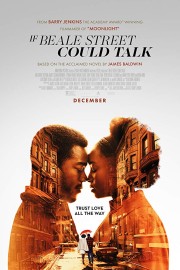If Beale Street Could Talk
I haven’t had a movie love story hit me like this one since Linklater’s “Before” trilogy. As with Linklater, Barry Jenkins loves to make films that study a lifetime, while also centering on individual moments. His Oscar-winner, “Moonlight,” was the life of a boy whose struggle to figure out his identity felt just as all-encompassing as “Boyhood,” and his latest film, “If Beale Street Could Talk,” shows us moments in the lives, and love, of Fonny and Tish from when they were growing up together, to the point in their lives they are now, and there are not many other film romances that filled my heart with hurt and love like this one did. It is, quite simply, the movie of the year for me.
The film begins with the words of James Baldwin (the subject of the phenomenal documentary, “I Am Not Your Negro”), the writer and philosopher whose book is being adapted by Jenkins. The words discuss what Beale Street means to Baldwin- it isn’t just the physical location where Louis Armstrong and Jazz were born, but a representation of the black American experience, which will play out in this tale of two young lovers in 1970s New York whose story could easily have taken place 20 years prior, or even in the present day. You can see precisely why Jenkins wanted to tell this story, and why it was so important for him to bring to life now. Jenkins is a filmmaker who seems to live by Roger Ebert’s philosophy of cinema as “empathy machines”- his films may be deeply personal, but they are universal in how they resonate with their audiences.
When we first see them, Fonny (Stephan James) and Tish (Kiki Layne) are expressing their love for one another. These two have grown up together, and they are at a point where marriage is something very much on their mind. The next thing we see, though, is Tish visiting Fonny in jail. We will discover that he has been accused of rape, but the legal proceedings of trying to get him out of prison is not what Tish is going to talk to him about. She is pregnant with his child, and the hope is that he will be out in time for the birth. As the case drags on, however, that is less and less likely, and the family surrounding them, and the lawyer they have hired, have to figure out a way to get him out while also being able to financially support not only that effort, but for Tish to have the baby.
I could not have loved the performances by James and Layne more. We see the hearts of Tish and Fonny, and we immediately sympathize with them, and want to see them together in the end. We see them as kids, playing in the bathtub together. We see them looking for studio apartments together, and when Fonny describes the layout to Tish and the landlord (Dave Franco), we almost see it come to life, as well. We see them making love, including the moment they conceive the child all their work to get Fonny out of jail will be for. We see Tish and Fonny spending an afternoon entertaining Daniel (Brian Tyree Henry), a friend of Fonny’s, and who is his alibi for the time of the rape he allegedly committed. We see a run-in with the officer who will later arrest Fonny. And we see them overjoyed by the prospect of getting an apartment, and starting their life together. This alone is a full piece of storytelling that we would be thrilled to watch, but there’s also the matter of family, and with an early scene where the respective families are told of the pregnancy, a few key players stand out. One is Fonny’s conservative and religious mother (played with fire and righteousness by Aunjanue Ellis), who admonishes Tish, and wishes ill on the baby, but this outburst will be the only time we see her. More vivid is Tish’s mother, played by the amazing Regina King, who is so supportive she will go confront the rape victim herself to try and make her see it couldn’t have been Fonny (whose real name is Alonzo, by the way). I come back to the fathers, though; the dads played by Colman Domingo (as Tish’s father) and Michael Beach (as Fonny’s) are over the moon about being grandfathers, and we see them bond as they do everything they can to help their kids out, and try to give them a better life than they have. This is as much a representation of the closeness of families whom have been in each other’s lives for decades as it is about the love between Tish and Fonny, and I’m here for every single minute of it.
“If Beale Street Could Talk” is a masterful film in every way. Especially when it comes to the performances and writing, but the way Jenkins directs the film, edits the story with Joi McMillon and Nat Sanders; brings 1970s New York to life with production designer Mark Friedberg; shoots and lights the film with cinematographer James Laxon; and pulls a haunting, emotional score from composer Nicholas Britell. This is a film made with love, about love, that brings us closer to the best humanity has to offer, even if it’s through a painful looking glass of what so many other Tish’s and Fonny’s have had to go through, solely by virtue of the color of their skin. I will not soon forget this film, and I cannot wait to see it again.










